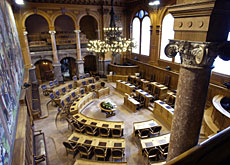Run-off elections confirm polarisation of politics

The Left and Right have emerged the overall winners of Sunday’s run-off Senate elections.
Both the centre-left Social Democratic Party and the rightwing Swiss People’s Party made gains in the votes, which took place in cantons Fribourg, Neuchâtel, Schwyz and Vaud.
The centre-right Radical Party lost three seats in the elections – two to the Social Democrats in Neuchâtel and Fribourg, and one to the People’s Party in Schwyz.
The Radicals managed to hold on to their seat in canton Vaud, however, as did the Social Democrats.
Huguette Tschoumy, president of the Radicals’ Neuchâtel branch described the latest round of elections as a “black Sunday” for her party.
The defeats echo the significant losses suffered by both the Radicals and the other main centre-right party, the Christian Democrats, in October’s parliamentary elections.
Historic victory
But for the Social Democrats, Sunday’s votes marked a historic victory.
The party now holds both Senate seats in canton Neuchâtel for the first time.
With 29 per cent of the vote, the Social Democrats fended off the second-placed Radicals. The Radicals’ defeat in Neuchâtel was further compounded by the rising popularity of the People’s Party.
In Fribourg, the Social Democrats won a seat back after losing it four years ago. The Christian Democrats hold the other seat.
Rightwing Schwyz
In canton Schwyz, the rightwing People’s Party beat the Radicals to secure their second seat.
The People’s Party won the most seats in Switzerland’s parliamentary elections on October 19. The party has 55 out of the 200 seats in the House of Representatives.
The victory prompted the party to demand a second seat in the Swiss cabinet, with the party’s hardline figurehead, Christoph Blocher, stepping forward as a potential candidate.
Such a move would change the so-called “Magic Formula” – a power-sharing arrangement in place since 1959 through which the Social Democrats, Christian Democrats and Radical Party have two cabinet seats each, while the People’s Party has just one.
Blocher hopes to replace one of the Christian Democrat ministers in the cabinet because it is now the smallest of the four main parties.
swissinfo with agencies
The Senate, one of parliament’s two houses, has 46 members.
Each canton has two representatives in the Senate, while each of Switzerland’s six “half” cantons have only one.
Senate elections, like those for the House of Representatives, are held every four years.

In compliance with the JTI standards
More: SWI swissinfo.ch certified by the Journalism Trust Initiative


You can find an overview of ongoing debates with our journalists here . Please join us!
If you want to start a conversation about a topic raised in this article or want to report factual errors, email us at english@swissinfo.ch.